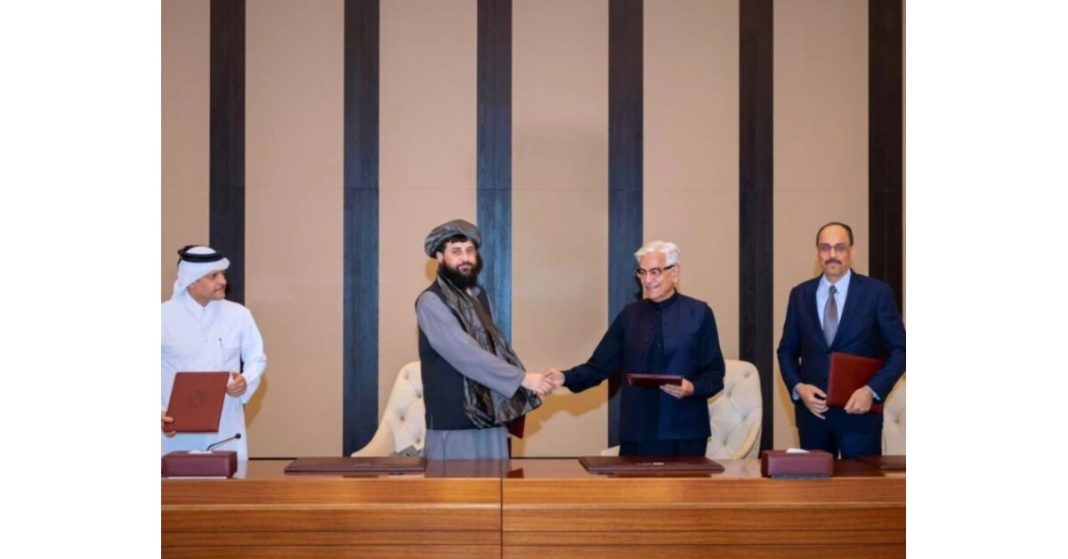According to several media reports, Qatar removed the border references from the updated statement on the Taliban on Afghanistan and Pakistan ceasefires. Qatar’s Ministry of Foreign Affairs had updated its official statement on Saturday’s ceasefire between the Taliban and Pakistan, removing a reference to the border between the two countries, a change that has triggered political debate within Pakistan.
Border or Brotherhood? How a Phrase Sparked a Political Row
The original statement, published after the conclusion of talks in Doha and Qatar late Saturday, said the ceasefire could help reduce tensions on the border between the two brotherly countries. In the revised version, released 18 hours later, the phrase was changed to between the two brotherly countries, removing references to the border between Pakistan and Afghanistan.
The change has drawn attention in Afghanistan and Pakistan’s political and media circles, where the issue of the Durian Line, the disputed border between Pakistan and Afghanistan, remains a sensitive issue.
Why the Word “Border” Is Politically Charged
Afghanistan has historically refused to recognize the Durian Line as an international border and instead called it an imaginary line dividing Pakistan and Afghanistan.
The updated paragraph now reads: “The Ministry of Foreign Affairs expressed the State of Qatar’s hope that this important step will contribute to ending tensions between the two brotherly countries and form a solid foundation for sustainable peace in the region.”
Did @MofaQatar_EN consult Pakistan before omitting “border” from the Doha talks communique to appease the Afghan Taliban, or have Qataris taken Pakistan for granted again? @ForeignOfficePk pic.twitter.com/7nhipEWR9a
— Baqir Sajjad (@baqirsajjad) October 19, 2025
Some analysts believe that Qatar’s revised statement is a diplomatic move aimed at avoiding the appearance of recognizing the Durand Line, especially in light of domestic reactions in Afghanistan. On the other hand, Pakistani analysts believe that Qatar has avoided recognizing the Durand Line between Pakistan and Afghanistan.
Regional Responses: Pakistan, Saudi Arabia and Turkey
However, on the other hand, Saudi Arabia has also welcomed a truce between Pakistan and Afghanistan brokered by Qatar and Turkey. However, in their statement, they have a broader phrase implying that they recognize the Durand Line as the border between Pakistan and Afghanistan.
Qatar just removed the “Border” from the statement and updated last night’s statement on their website on the behest of the Afghan Taliban. No response from Pakistan’s foreign office as yet. But the Afghan Taliban consider it their diplomatic win. https://t.co/w2PpPXsa0B pic.twitter.com/voV2UUytvA
— Iftikhar Firdous (@IftikharFirdous) October 19, 2025
The statement read, “The Kingdom hopes that this positive step The Kingdom hopes that positive steps will lead to an end to tensions on the border between the two countries. The Ministry also appreciates the diplomatic efforts and the constructive role played by the State of Qatar and the Republic of Turkey in this regard.”
In a post on X, the Saudi foreign ministry described the truce as a “vital step” toward enduring peace between the “brotherly peoples of Pakistan and Afghanistan”.
#Statement | The Foreign Ministry expresses the Kingdom of Saudi Arabia’s welcome of the signing by the Islamic Republic of Pakistan and Afghanistan of an immediate ceasefire and the establishment of mechanisms to consolidate lasting peace and stability between the two countries,… pic.twitter.com/Om4pxSCS55
— Foreign Ministry 🇸🇦 (@KSAmofaEN) October 19, 2025
The agreement was confirmed by Pakistan’s Defence Minister Khawaja Muhammad Asif and a spokesman for the Afghan government, who said both sides would refrain from hostilities and work to establish mechanisms for lasting peace.
The Ceasefire Agreement and Its Immediate Impact
Afghanistan and Pakistan, embroiled in fighting that has killed dozens of people and injured hundreds, pledged on Sunday to respect a ceasefire.
The truce, mediated by Qatar and Turkey, came into effect immediately and is intended to pause hostilities.
Violence has escalated between the neighbors since earlier this month, with each country saying they were responding to aggression from the other. Afghanistan denies harboring militants who carry out attacks in border areas.
Pakistan is grappling with militancy that has surged since 2021, when the Taliban seized control of Afghanistan and returned to power.
The Taliban government’s chief spokesman, Zabihullah Mujahid, gave a positive response to the outcome of the talks that took place in the Qatari capital, Doha, a day earlier. He said both countries had signed a bilateral agreement.
“It has been decided that neither country will undertake any hostile actions against the other, nor will they support groups carrying out attacks against Pakistan. Both sides will refrain from targeting each other’s security forces, civilians, or critical infrastructure.”
Read more: Afghanistan Accuses Pakistan of Killing Local Cricketers in Airstrike
Later, during an online news conference, Defense Minister Muhammad Yaqoob told journalists that the Doha talks lasted 13 hours.
Pakistani Defense Minister Khawaja Asif posted confirmation of the deal on X.
“Cross-border terrorism from Afghan territory will cease immediately,” Asif wrote. “Both countries will respect each other’s sovereignty and territorial integrity. A follow-up meeting between the delegations is scheduled to take place in Istanbul on October 25 to discuss the matters in detail.”
Top officials from both countries thanked Qatar and Turkey for their role in facilitating the talks that led to the ceasefire.
The fighting between Afghanistan and Pakistan has severely disrupted people’s lives. The two countries share a 2,611-kilometer (1,622-mile) long border known as the Durand Line, which Afghanistan has never recognized. They have just two main trade routes.
Worsening security has forced locals to leave their homes and also left thousands of people and vehicles stranded for a week at border points.
The Chaman crossing in southwest Pakistan is only open for Afghan refugees to leave as part of a nationwide crackdown on foreigners living in Pakistan illegally. Entry from Afghanistan, including trade and pedestrian movement, remains suspended.
With Additional Inputs from GVS South Asia Desk














